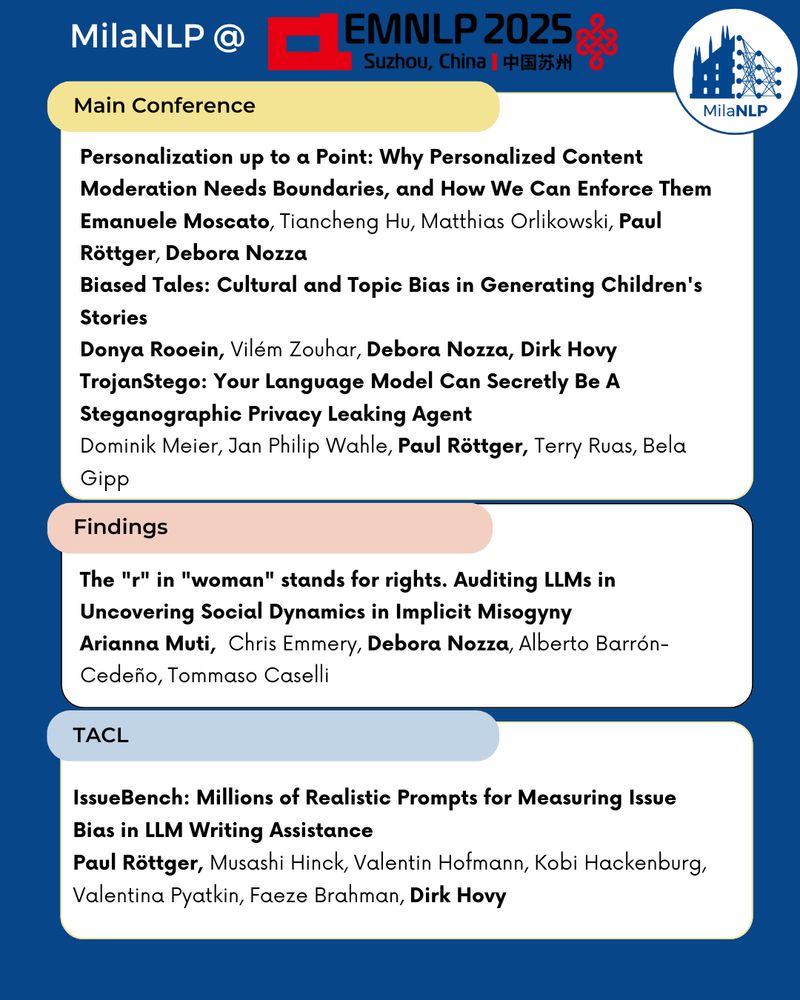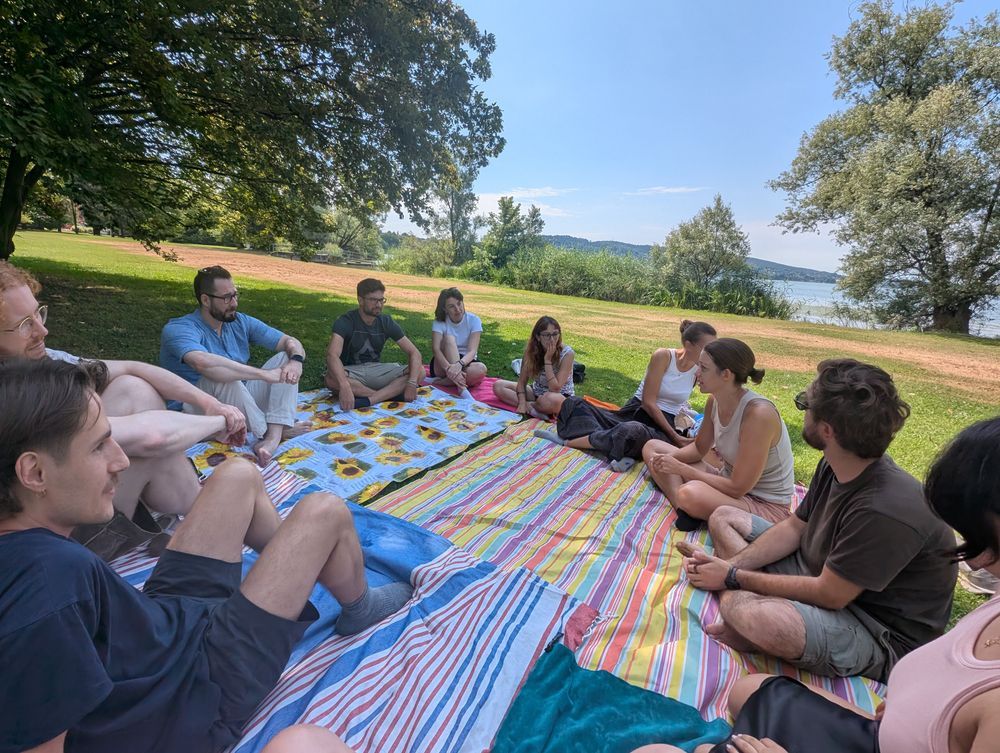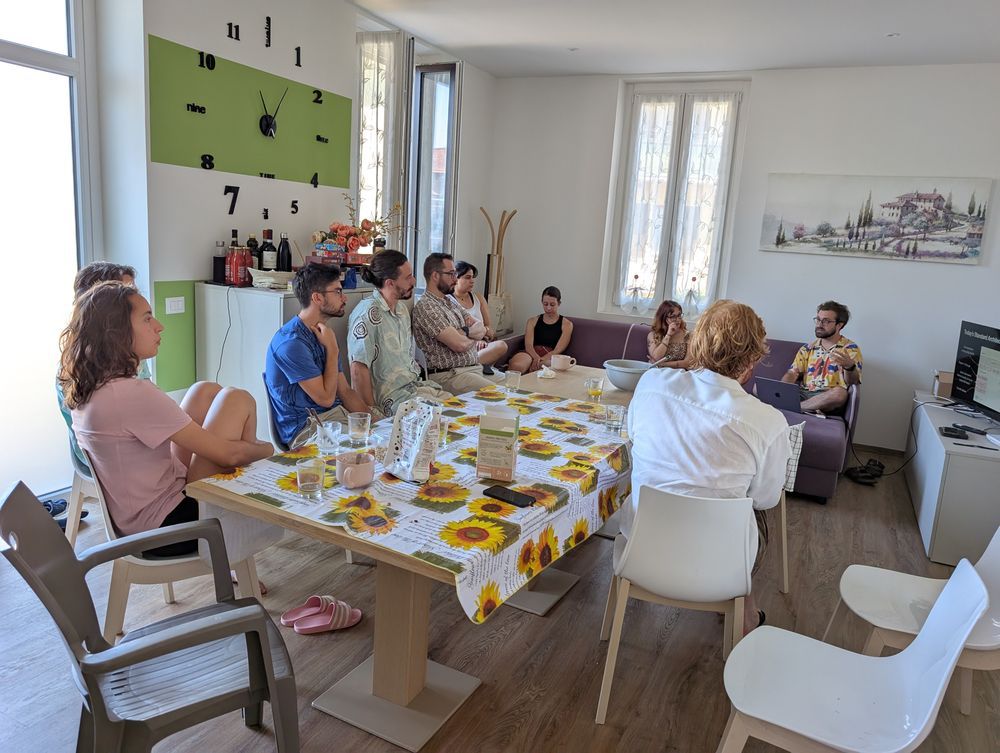I will be @euripsconf.bsky.social this week to present our paper as non-archival at the PAIG workshop (Beyong Regulation:
Private Governance & Oversight Mechanisms for AI). Very much looking forward to the discussions!
If you are at #EurIPS and want to chat about LLM's training data. Reach out!
02.12.2025 21:47 — 👍 8 🔁 4 💬 0 📌 0
We could fool ourselves saying that it's because there's no panettone in other periods of the year :P
27.11.2025 19:32 — 👍 1 🔁 0 💬 0 📌 0
We go out of the routine every now and then at the lab. :)
27.11.2025 16:08 — 👍 4 🔁 0 💬 1 📌 0
In this paper, we investigate how well media frames generalize across different media landscapes. The 15 MFC frames remain broadly applicable, but requires revisions of the guidelines to adapt to the local context.
More on aclanthology.org/2025.starsem...
24.11.2025 10:36 — 👍 3 🔁 1 💬 0 📌 0
@agnesedaff.bsky.social presented our work on "Generalizability of Media Frames: Corpus creation and analysis across countries" at *SEM co-located with EMNLP 2025 in China.
24.11.2025 10:36 — 👍 7 🔁 0 💬 1 📌 0
@mmitchell.bsky.social
18.11.2025 06:36 — 👍 0 🔁 0 💬 0 📌 0
Does anyone know any good resource that systematically documents information about the training data of different LLMs (e.g. name of datasets, language proportion, etc whenever available)?
18.11.2025 06:27 — 👍 2 🔁 0 💬 2 📌 0


Proud to present our #EMNLP2025 papers!
Catch our team across Main, Findings, Workshops & Demos 👇
31.10.2025 14:04 — 👍 11 🔁 4 💬 12 📌 2
Great, thanks a lot!
19.10.2025 09:59 — 👍 0 🔁 0 💬 0 📌 0
As I wasn't at the conference, I'd love to be able to watch the recording. Is it available online anywhere? :)
16.10.2025 09:01 — 👍 0 🔁 0 💬 1 📌 0
Great collaboration with Dmitry Nikolaev, @dominsta.bsky.social and @deboranozza.bsky.social ☺️
29.09.2025 14:54 — 👍 2 🔁 0 💬 0 📌 0
- Finally, and for me, most interestingly, our analysis suggests that political biases are already encoded during the pre-training stage.
Taken these evidences together, we highlight important implications these results play on data processing in the development of fairer LLMs.
29.09.2025 14:54 — 👍 1 🔁 0 💬 1 📌 0
- There's a strong correlation (Pearson r=0.90) between the predominant stances in the training data and the models’ behavior when probed for political bias on eight policy issues (e.g., environmental protection, migration, etc).
29.09.2025 14:54 — 👍 2 🔁 0 💬 1 📌 0
- Source domains of pre-training documents differ significantly, with right-leaning content containing twice as many blog posts and left-leaning content 3 times as many news outlets.
29.09.2025 14:54 — 👍 1 🔁 0 💬 1 📌 0
- The framing of political topics varies considerably: right-leaning labeled documents prioritize stability, sovereignty, and cautious reform via technology or deregulation, while left-leaning documents emphasize urgent, science-led mobilization for systemic transformation and equity.
29.09.2025 14:54 — 👍 1 🔁 0 💬 1 📌 0
- left-leaning documents consistently outnumber right-leaning ones by a factor of 3 to 12 across training datasets.
- pre-training corpora contains about 4 times more politically engaged content than post-training data.
29.09.2025 14:54 — 👍 4 🔁 0 💬 1 📌 0
We have the answers of these questions here : arxiv.org/pdf/2509.22367
We analyze the political content of the training data from OLMO2, the largest fully open-source model.
🕵️♀️ We run an analysis in all the datasets (2 pre- and 2 post-training) used to train the models. Here are our findings:
29.09.2025 14:54 — 👍 5 🔁 0 💬 1 📌 0

📣 New Preprint!
Have you ever wondered what the political content in LLM's training data is? What are the political opinions expressed? What is the proportion of left- vs right-leaning documents in the pre- and post-training data? Do they correlate with the political biases reflected in models?
29.09.2025 14:54 — 👍 47 🔁 14 💬 2 📌 1
Tanise Ceron, Dmitry Nikolaev, Dominik Stammbach, Debora Nozza: What Is The Political Content in LLMs' Pre- and Post-Training Data? https://arxiv.org/abs/2509.22367 https://arxiv.org/pdf/2509.22367 https://arxiv.org/html/2509.22367
29.09.2025 06:31 — 👍 1 🔁 3 💬 0 📌 0
Thanks SoftwareCampus for supporting Multiview, the organizers of INRA, and Sourabh Dattawad and @agnesedaff.bsky.social for the great collaboration!
26.09.2025 16:20 — 👍 1 🔁 0 💬 0 📌 0
Our evaluation with normative metrics shows that this approach does not diversify only frames in user's history, but also sentiment and news categories. These findings demonstrate that framing acts as a control lever for enhancing normative diversity.
26.09.2025 16:20 — 👍 0 🔁 0 💬 1 📌 0
In this paper, we propose introduce media frames as a device for diversifying perspectives in news recommenders. Our results show an improvement in exposure to previously unclicked frames up to 50%.
26.09.2025 16:20 — 👍 0 🔁 0 💬 1 📌 0

Today Sourabh Dattawad presented our work "Leveraging Media Frames to Improve Normative Diversity in News Recommendations" at INRA (International Workshop on News Recommendation and Analytics) co-located with RecSys 2025 in Prague.
arxiv.org/pdf/2509.02266
26.09.2025 16:20 — 👍 2 🔁 1 💬 1 📌 0

We present our new preprint titled "Large Language Model Hacking: Quantifying the Hidden Risks of Using LLMs for Text Annotation".
We quantify LLM hacking risk through systematic replication of 37 diverse computational social science annotation tasks.
For these tasks, we use a combined set of 2,361 realistic hypotheses that researchers might test using these annotations.
Then, we collect 13 million LLM annotations across plausible LLM configurations.
These annotations feed into 1.4 million regressions testing the hypotheses.
For a hypothesis with no true effect (ground truth $p > 0.05$), different LLM configurations yield conflicting conclusions.
Checkmarks indicate correct statistical conclusions matching ground truth; crosses indicate LLM hacking -- incorrect conclusions due to annotation errors.
Across all experiments, LLM hacking occurs in 31-50\% of cases even with highly capable models.
Since minor configuration changes can flip scientific conclusions, from correct to incorrect, LLM hacking can be exploited to present anything as statistically significant.
🚨 New paper alert 🚨 Using LLMs as data annotators, you can produce any scientific result you want. We call this **LLM Hacking**.
Paper: arxiv.org/pdf/2509.08825
12.09.2025 10:33 — 👍 269 🔁 96 💬 6 📌 21
Qualtrics Survey | Qualtrics Experience Management
The most powerful, simple and trusted way to gather experience data. Start your journey to experience management and try a free account today.
🔍 Stiamo studiando come l'AI viene usata in Italia e per farlo abbiamo costruito un sondaggio!
👉 bit.ly/sondaggio_ai...
(è anonimo, richiede ~10 minuti, e se partecipi o lo fai girare ci aiuti un sacco🙏)
Ci interessa anche raggiungere persone che non si occupano e non sono esperte di AI!
03.06.2025 10:24 — 👍 16 🔁 18 💬 1 📌 0
Reminder for the importance of evaluating political biases robustly. :)
15.05.2025 15:42 — 👍 1 🔁 0 💬 0 📌 0
We (w/ @diyiyang.bsky.social, @zhuhao.me, & Bodhisattwa Prasad Majumder) are excited to present our #NAACL25 tutorial on Social Intelligence in the Age of LLMs!
It will highlight long-standing and emerging challenges of AI interacting w humans, society & the world.
⏰ May 3, 2:00pm-5:30pm Room Pecos
03.05.2025 13:58 — 👍 14 🔁 6 💬 0 📌 0
Research on AI and biodiversity 🌍
Asst Prof at MIT CSAIL,
AI for Conservation slack and CV4Ecology founder
#QueerInAI 🏳️🌈
PhD candidate in political science at the EUI [On the 25/26 job market].
Currently visiting Harvard's Department of Government.
Interested in: political behavior, quantitative methods, metascience.
https://www.jorisfrese.com/
PhD candidate at University of Mannheim | LLMs and synthetic data
Website: https://maxbenkre.github.io/
linguist turned NLP researcher, PhD student @cambridgenlp
EurIPS is a community-organized, NeurIPS-endorsed conference in Copenhagen where you can present papers accepted at @neuripsconf.bsky.social
eurips.cc
PhD Student at MILA/McGill University with Prof. Siva Reddy and Prof. Vered Shwartz. Previously UBC-CS.
Studying societal impacts of AI, alignment and safety.
Based in Montreal🇨🇦
Trinity College Dublin’s Artificial Intelligence Accountability Lab (https://aial.ie/) is founded & led by Dr Abeba Birhane. The lab studies AI technologies & their downstream societal impact with the aim of fostering a greater ecology of AI accountability
Recommender systems and AI researcher at JRC/ECAT. Reads books, rides waves and plays in a band.
Centre for Democracy and Technology Europe 🇪🇺 Advancing EU law and tech policy with a focus on democracy and human rights.
Part of @cdt.org's Global team.
https://cdt.org/eu/
The Center for Democracy & Technology. Shaping technology policy and architecture, with a focus on equity and justice. @cdteu.org for our EU-based team.
https://cdt.org
Climate & AI Lead @HuggingFace, TED speaker, WiML board member, TIME AI 100 (She/her/Dr/🦋)
Philosopher in tech, currently at @hf.co. Doctor of talking machines and moral gray areas.
Technology + democracy.
Visit https://techpolicy.press
Join our newsletter: https://techpolicy.press/newsletter
Opinions do not reflect the views of Tech Policy Press. Reposts do not equal endorsements.
Economist and legal scholar turned AI researcher focused on AI alignment and governance. Prof of government and policy and computer science at Johns Hopkins where I run the Normativity Lab. Recruiting CS postdocs and PhD students. gillianhadfield.org
EU Policy Lead & Applied Researcher @ Hugging Face 🤗
Computer Scientist, PhD
Wikipedia & languages are my ♡
Workshop on Gender Bias for Natural Language Processing @ ACL 2025 in Vienna, Austria
🌐 https://gebnlp-workshop.github.io/
When the going gets weird the weird turn pro.
Director of Effective Altruism DC linktr.ee/andymasley
Researcher | University of Vienna | Computational Social Science | Comparative Research
Uses machine learning to study literary imagination, and vice-versa. Likely to share news about AI & computational social science / Sozialwissenschaft / 社会科学
Information Sciences and English, UIUC. Distant Horizons (Chicago, 2019). tedunderwood.com
I do research in social computing and LLMs at Northwestern with @robvoigt.bsky.social and Kaize Ding.








